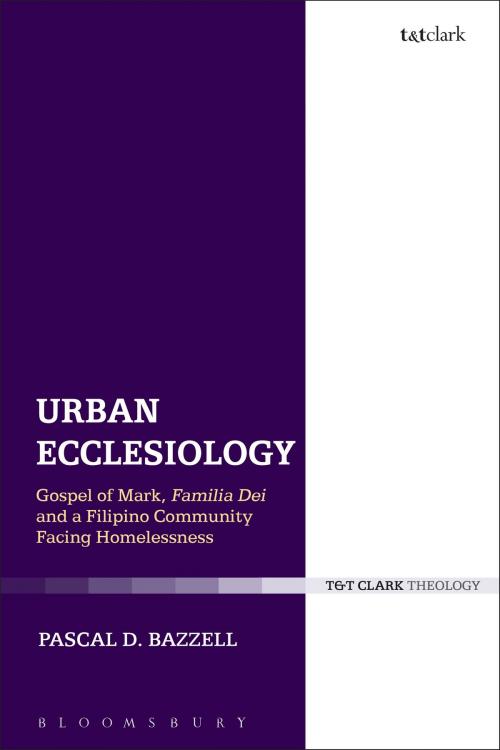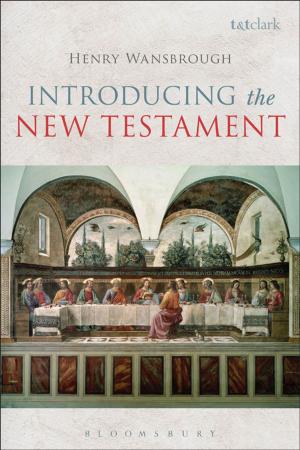Urban Ecclesiology
Gospel of Mark, Familia Dei and a Filipino Community Facing Homelessness
Nonfiction, Religion & Spirituality, Theology, Christianity| Author: | Pascal D. Bazzell | ISBN: | 9780567659828 |
| Publisher: | Bloomsbury Publishing | Publication: | May 21, 2015 |
| Imprint: | T&T Clark | Language: | English |
| Author: | Pascal D. Bazzell |
| ISBN: | 9780567659828 |
| Publisher: | Bloomsbury Publishing |
| Publication: | May 21, 2015 |
| Imprint: | T&T Clark |
| Language: | English |
Pascal D. Bazzell brings the marginal ecclesiology of a Filipino ecclesial community facing homelessness (FECH) into contemporary ecclesiological conversation in order to deepen the ecumenical understanding of today's ecclesial reality. He contributes relevant data to support a theory of an ecclesial-oriented paradigm that fosters ecclesial communities within homeless populations. There is an extensive dialogue occurring between ecclesiologies, church planting theories or urban missions and the urban poor. Yet the situation with the homeless population is almost entirely overlooked. The majority of urban mission textbooks do not acknowledge an ecclesial-oriented state of being and suggest that the street-level environment is a place where no discipleship can occur and no church should exist. By presenting the FECH's case study Bazzell emphasizes that it is possible to live on the streets and to grow in the faith of God as an ecclesial community.
To be able to describe the FECH's ecclesial narrative, Bazzell develops a local ecclesiological methodology that aims to bridge the gap between more traditional systematic and theoretical (ideal) ecclesiology and practical oriented ecclesiology (e.g. congregational studies) in order to hold together theological and social understandings of the church in its local reality. He articulates a theological framework for the FECH to reflect on who they are (the essence of identity studies), who they are in relationship to God (the essence of theological studies), and what that means for believers in that community as they relate to God and to each other in ways that are true to who they are and to who God intends them to be (the essence of ecclesial studies). The research provides a seldom-heard empirical tour into the FECH's social world and communal identity. The theological findings from the FECH's hermeneutical work on the Gospel of Mark reveal an understanding of church being developed as gathering around Jesus that creates a space for God's presence to be embodied in their ordinary relationships and activities and to invite others to participate in that gathering. Moreover, it addresses ecclesial issues of the supernatural world; honor/shame values; and further develop the neglected image of the familia Dei in classical ecclesiology that encapsulates well the FECH's nature, mission and place.
Pascal D. Bazzell brings the marginal ecclesiology of a Filipino ecclesial community facing homelessness (FECH) into contemporary ecclesiological conversation in order to deepen the ecumenical understanding of today's ecclesial reality. He contributes relevant data to support a theory of an ecclesial-oriented paradigm that fosters ecclesial communities within homeless populations. There is an extensive dialogue occurring between ecclesiologies, church planting theories or urban missions and the urban poor. Yet the situation with the homeless population is almost entirely overlooked. The majority of urban mission textbooks do not acknowledge an ecclesial-oriented state of being and suggest that the street-level environment is a place where no discipleship can occur and no church should exist. By presenting the FECH's case study Bazzell emphasizes that it is possible to live on the streets and to grow in the faith of God as an ecclesial community.
To be able to describe the FECH's ecclesial narrative, Bazzell develops a local ecclesiological methodology that aims to bridge the gap between more traditional systematic and theoretical (ideal) ecclesiology and practical oriented ecclesiology (e.g. congregational studies) in order to hold together theological and social understandings of the church in its local reality. He articulates a theological framework for the FECH to reflect on who they are (the essence of identity studies), who they are in relationship to God (the essence of theological studies), and what that means for believers in that community as they relate to God and to each other in ways that are true to who they are and to who God intends them to be (the essence of ecclesial studies). The research provides a seldom-heard empirical tour into the FECH's social world and communal identity. The theological findings from the FECH's hermeneutical work on the Gospel of Mark reveal an understanding of church being developed as gathering around Jesus that creates a space for God's presence to be embodied in their ordinary relationships and activities and to invite others to participate in that gathering. Moreover, it addresses ecclesial issues of the supernatural world; honor/shame values; and further develop the neglected image of the familia Dei in classical ecclesiology that encapsulates well the FECH's nature, mission and place.















